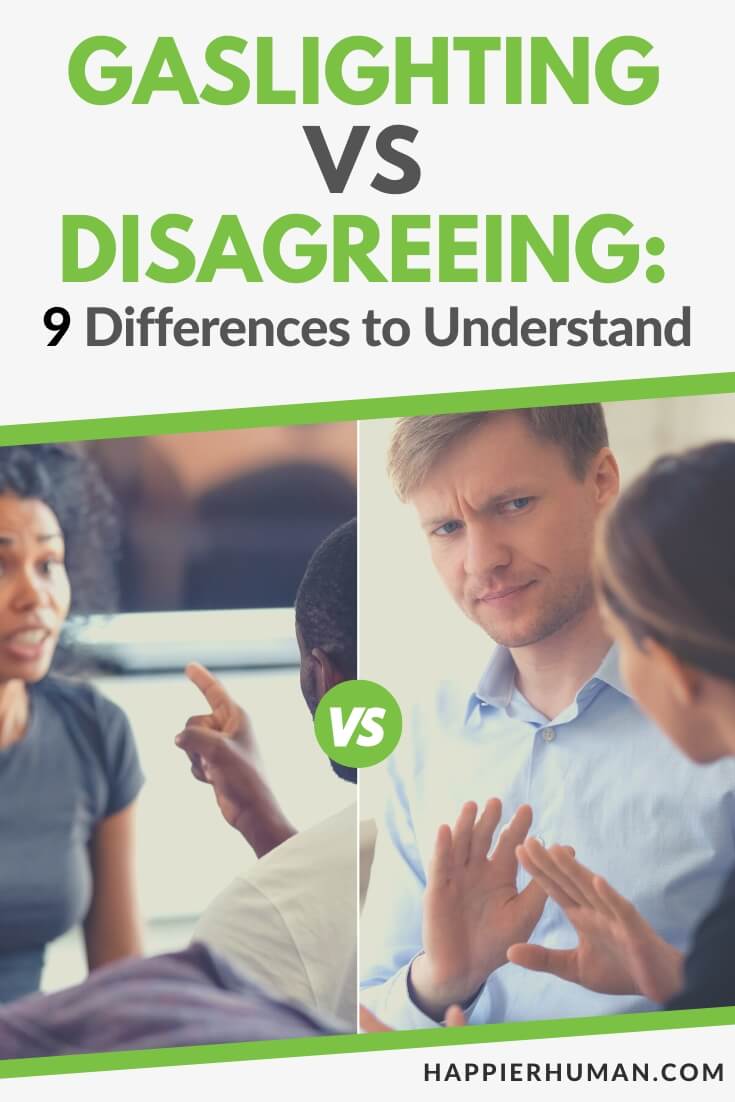“There you go overthinking everything again!” “I never did such a thing! You’re dreaming it all up!” “You’re crazy, and everyone else can see it too!”
If you’ve ever heard these words, you need to read this article on “gaslighting vs disagreeing.” It will change the way you think, feel and react to this ugly behavior known as gaslighting.
It may be difficult to acknowledge the differences between gaslighting and disagreeing sometimes. They are both forms of conflict, rooted in differences in opinions, and have negative ramifications. Right?
In this article, you will discover what gaslighting and disagreeing are, how and why they are done, their negative ramifications, their significant differences, and hope for healing.
Now, let’s dial in and analyze these critical manipulation and communication techniques.
What is Gaslighting?
Gaslighting is the psychological and emotional manipulation for control that makes the target question their sanity, judgment, and self-esteem. It is a dangerous tactic to strip a victim of power, authority, or the ability to recall something they may have witnessed.
Gaslighting is not a communication tool… but a cruel, abusive weapon meant to devastate, shame, and isolate another person. See if you recognize any of the following gaslighting methods.
Ways of Gaslighting
Medical News Today explains the ways gaslighting is carried out. At times, these characteristics may appear harmless, but looking at the bigger picture says something different.
With gaslighting being defined and examples of how it is done, let’s examine why people do it in the first place.
Why People Gaslight
There are several reasons why people choose to gaslight others in their lives. Regardless of underlying factors or reasoning, gaslighting is always manipulative, abusive, and damaging.
The term “gaslight” originated from the 1938 stage play “Gas Light,” in which a manipulative husband convinces his wife that she is insane. Of course, the husband’s motive is not to help the woman but to commit her to an asylum so her fortune can be stolen.

Keep in mind that gaslighting is not a one-off, meaning it is a repeated pattern of behavior. If someone says something that appears manipulative or abusive, but it does not continue, it is not gaslighting.
The whole purpose of gaslighting is to wear you down, strip you of your ability to think clearly and make you entirely dependent on the other person. This takes repetitive behavior.
Here are some reasons why people gaslight:
Negative Ramifications of Gaslighting
Gaslighting is not just a difference of opinion or a persuasive move to convince you of a set of facts. It is manipulation and abuse.
The following adverse effects of gaslighting may be long-term and life-changing:
What is Disagreeing?
Disagreeing is a brilliant communication tool that stimulates critical thinking, self-evaluation, and learning. The challenge that disagreeing creates enables us to strengthen, expand, and polish our ideas.
Disagreements and debates are the foundation of how relationships, societies, and governments grow and evolve. They are vital to human communication and development.
Healthy disagreements do not attack, insult, belittle, shame, or manipulate. Look over this list of ways to disagree and see how many you recognize.
Ways of Disagreeing
With the definition of disagreeing and examples out of the way, let’s look at why people disagree in communication.
Why People Disagree
Again, there are numerous reasons why people disagree with one another. Be it a difference in values or beliefs or persuasive communication, disagreements have shaped our civilizations, societies, and everyday lives.

Although it is believed that humans have practiced the art of disagreeing from the beginning of our species, the term “disagreement” didn’t originate in English until the late 15th Century. Even then, the word carries various meanings.
Disagreements don’t typically involve repeated or manipulative patterns of behavior. If they do, they are not disagreements but something else.
These are a few reasons why people disagree:
Negative Ramifications of Disagreeing
Disagreeing is not a personal attack. It is a difference of opinion, that is all. If abuse, fighting, or a personal attack does ensue, there is another issue at work besides disagreeing.
And there is a chance that the interaction doesn’t play out as planned. If negative effects emerge from disagreeing, try improving your listening and communication skills first. Then, try again following the rules of the road: don’t become emotional, be kind, and listen, listen, listen.
The following negative ramifications of disagreeing may include:
Disagreeing can go south if your emotions become combative, non-listening, and stubborn. Otherwise, it should expand your thinking and improve your ideas, your life, and our world.
Disagreeing allows the unique opportunities to:
Recovery from Gaslighting
Unlike a disagreement, gaslighting is painful and heartbreaking. The wound inflicted on your soul will take time to heal, but it can heal. If you are recovering from a gaslighting experience, the following should help get you back on track.
The following list of “nine differences to understand” demonstrates how you can determine if you have gaslighting in your life or if it’s actually a healthy way of disagreeing. It is important for you to know so you can take active measures to maintain your mental, physical, and spiritual health and well-being.
Gaslighting VS Disagreeing: 9 Differences to Understand
Knowing the differences between gaslighting and disagreeing is fundamental to the building blocks of health and wellness. While disagreements may or may not turn toxic, gaslighting is undoubtedly detrimental.
Here are nine differences between gaslighting and disagreeing that you should understand.
1. Questioning Real Facts vs Attacking Your Perspective of Reality.
Asking for evidence or facts to support an argument is the natural process of a healthy disagreement.
Attacks on your person fly in the face of that, leaving nowhere for the argument to go but downhill. That is gaslighting’s purpose.
2. End Goal of Resolve or Compromise vs Erasing Your Ability to Think Clearly.
The core purpose of disagreeing is to reach an end goal of resolve or compromise to level the playing field. Gaslighting doesn’t just erase the end goal; it also erases the playing field altogether.
3. Speaking from a Point of View vs Cornering You with False Accusations.
Two people speaking their opinions from their own points of view is a healthy approach to a disagreement. However, corralling one person into a corner with no escape or ability to react is classic gaslighting.
4. Viewing Things Differently vs Spouting Blatant Lies.
Because we have unique experiences and backgrounds, it makes sense that we will see things differently, which should be respected.
But when gaslighting ignites, the spewing of belligerent lies dominates the atmosphere and wipes away an appreciation for those very differences.
5. Bothersome Communication vs Communication that Doesn’t Align with Actions.
Sometimes, in disagreements, the other person’s argument style is bothersome and needs adjusting to make the communication work.

With gaslighting, the torch master will tell you one thing but align their actions to the opposite, then tell you that you’re crazy.
6. May Include Others in the Dialogue vs High jacking Others’ Words to Attack You.
Typical disagreements may bring in the opinions of others to add to the richness and think-tank style of branding new ideas. Gaslighting brings in others’ words to cut you down and put you in your place.
7. May Involve a Change of Mind vs No Interest in Learning or Compromising.
Disagreeing can involve one or both people changing their minds as the argument develops. In gaslighting, there is no interest in collaborating, learning, or compromising.
8. Occurs Around Specific Topics vs Occurs Even with No Topic.
Disagreements often arise around specific topics of interest or passion. A gaslighter will initiate their tactics even when no specific topic is there. They’ll just make one up.
9. Rarely Results in Personal Attacks or Injury vs Always Results in Personal Attacks or Injury.
Disagreeing shouldn’t result in personal attacks or harm unless fiery passions come unhinged, turning the disagreement into a different animal. Gaslighting always involves disparaging attacks and harm, even though they may be subtle spirit-cutting remarks.
Final Thoughts on Gaslighting vs Disagreeing
“Gaslighting vs disagreeing” is not clear-cut. Both have negative ramifications and can make situations worse. However, disagreements done right have the potential to open minds to new or better ideas, compromise, and peace. Those are assets that gaslighting will never be able to produce.
The differences between gaslighting and disagreeing are profound and share little concerning overlapping similarities. Challenges like narcissistic personality disorder, antisocial personality disorder, and psychopathy exacerbate the intensity and damage caused by gaslighting.
For the victim, it may take a lifetime to recover. Take your first step toward healing from gaslighting by checking out 54 Ways to Become a Happier Person.
And if you're looking for more articles about gaslighting, be sure to check out these blog posts:
- Gaslighting Friends: Signs, Examples, and How to Respond
- Gaslighting in a Relationship: 7 Signs, Examples, and How to Stop It
- 11 Signs of Unintentional or Unconscious Gaslighting

Rain Story is an author and screenwriter. She is an alumna of the University of Arkansas at Little Rock, the University of New Mexico, and the University of Kentucky. She earned two B.A.s and four years of graduate studies in literature, languages, and creative writing before personal tragedies pulled her away from her graduate work. She is also a Donaghey Scholar and fellow of the William G. Cooper, Jr. Honors Program in English.


